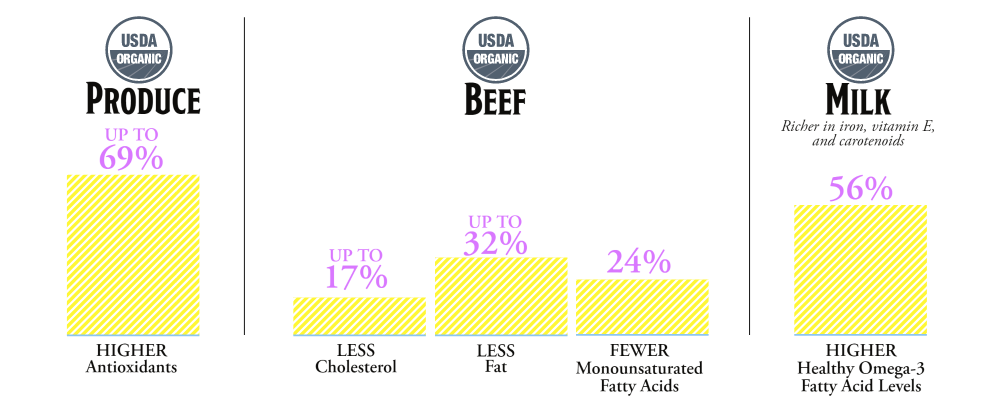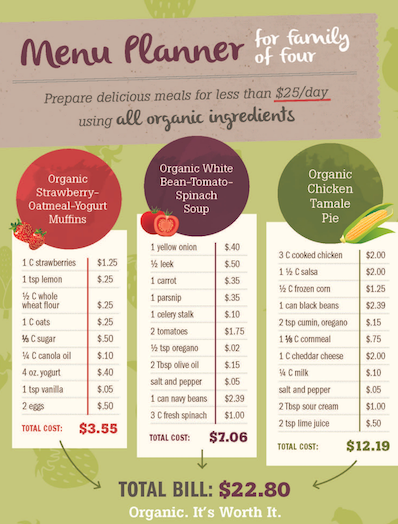It's simple, organic is good for people, good for the planet, and good for communities.
We are all aware of the essentials of living a healthy life - getting good sleep, drinking enough water, and eating healthily. In this day in age, as food ingredients are becoming more visible in packaging, consumers are a fingertip away from a Google search on what their buying in real-time. Organic is the only label claim federally certified to always be non-GMO and produced without harmful pesticides, chemical preservatives, or antibiotics.
Whichever sustainability benefits are most important to your community, from reducing greenhouse gases to regenerating soil health, there’s only one option that addresses the full suite of environmental and social concerns and is backed up by federal certification—USDA Organic.
The organic industry strives to give you and your family what you want. The toxicity of chemical pesticides in food products can cause cancer, hormone disruption and birth defects. According to a UN report, around 200,000 people die every year due to the toxic effects of pesticides in food products. Shoppers today have increasingly high expectations for brands and retailers. This is causing consumers to shift their focus towards organic food products and non-food products. Consumers expect to see the full scope of their values reflected in the products they choose—this includes not just environmental sustainability, but also animal welfare and social justice.
With this in mind, the next time you go to a grocery store, find the conventional item you may buy and compare it to a similar USDA organic certified product. Take the time to read the labels and the ingredients and ask yourself if the conventional item you picked aligns with the benefits you want for yourself. Which item brings you greater benefits?
Organic is the only label that is federally certified to always be non-GMO and is produced without harmful pesticides, chemicals preservatives, or antibiotics.
Organic serves a greater purpose for individuals and communities. It not only keeps chemicals off your plate but it reduces your exposure to birth defects, obesity, diabetes, ADHD, and other health problems. In 2010 President Obama’s Cancer Panel reported that pesticide exposure is linked to various forms of cancer. The panel strongly recommends that people reduce their exposure to carcinogens by removing toxins from our food, water, and air. If social justice and rural economic development are important for your community, organic is always the best choice.
Organic food may provide you with ...
- Better nutrition
- More disease-fighting antioxidants
- More healthy omega 3 fatty acids
- No controversial pesticides or fertilizers
- No antibiotics
- No synthetic growth hormones
Learn more about organic health benefits and the research behind it from The Organic Center.

By relying on ecosystem services to produce food and fiber, organic farms have a regenerative (rather than extractive) effect on the environment. Organic standards require that farmers protect the natural resources on their lands, which makes organic farms key players in the fight against the climate crisis. Organic farmers are required to maintain or improve the natural resources on and around their farms, including soil, water, wetlands, and wildlife habitats. By avoiding toxic chemicals and maintaining healthy wildlife habitats, organic practices promote biodiversity and protect pollinators.
Did you know

Green Lemon
Emit 18% less global warming-causing gases and use ~50% less new reactive nitrogen (an extremely potent greenhouse gas).
Produce healthier soils that contain 13% higher total organic matter and capture 44% more stable sequestered carbon.
Releases 40% fewer carbon emissions.
Increase overall biodiversity by 30% and pollinator diversity by up to 50%.
Reduce nitrates released into groundwater by 50%.
Organic farmers use 61% less energy than conventional production.
Are more resilient; organic farms produce yields up to 40% higher than conventional systems in drought.
Conserve forests and wildlands; most organic operations are converted from land already in agricultural use, either from active conventional farms or fallowed fields.
A community is described as a "group of people living in the same place or having a particular characteristic in common".
As entrepreneurs, health care workers, teachers, or in any field of work - organic brings value and connection to your profession and community. People want to know that brands and retailers have carefully considered their values and integrated purpose and societal impact into the products they deliver. In fact, a majority of consumers report that organic is the label that best embodies their values. Unlike other eco-labels like “natural” or “regenerative”, the USDA Organic label is backed by 3rd party inspection, federally enforced, and provides traceability from the farm to the consumer.
Organic provides your community...

WHAT'S THE VALUE?
The value is simple, organic means more nutrition, fewer chemicals, mitigating climate change, and healthier ecosystems. In fact, organic food sales are increasing by the double digits annually, and more than 80 percent of parents reported buying organic food for their families last year. While there’s great momentum for organic sales, the overwhelming reason people give for not purchasing it is that it’s too expensive. However, there are many ways families can enjoy all organic meals every day affordably.
Find below, a breakdown of how families of four can enjoy all organic on budgets of $25/day or less, and still reap organic’s full nutritional and sustainable benefits. To show you how, OTA offers a menu of ingredients for all organic breakfast, lunch and dinner, while The Organic Center highlights their scientific benefits. Not sure what to make? Head to The Organic Center Recipe page for delicious organic meals to make.
Organic food and product should be widely available because of their health and environmental benefits. However, that isn’t the case all the time due to too many reasons. For farmers, there may be scarce support or resources to grow organic compared to their conventional neighbors. For communities of color, experiences of food insecurity occur where they tend to shop. But there are plenty of ways to source organic foods. Here are 5 ways to access organic near you!
Blue
Bring access to fresh organic foods by simply planting a seed in your garden, a windowsill plant box, or your rooftop garden. You may even be able to find a garden in your community.
If you don't have access to local organic food the option to get organic can always be delivered. A few that we like are Misfits Market, Farmbox, and Imperfect Foods.
Community Gardens was founded in the U.S around the 1890s. Its mission is to have community members share a plot of land to grow fresh produce. Curious to know where your community garden is? Use the American Community Garden Association website to find the closes one to you and if you cannot locate one, start a community garden using this resource.
All around the U.S you can find donated fresh and local foods from farmers, grocery stores, and retailers at food banks and pantries. To locate a one near you visit this website.
Explore farm stands and farmer's markets. Search here to find the closes market to you.


